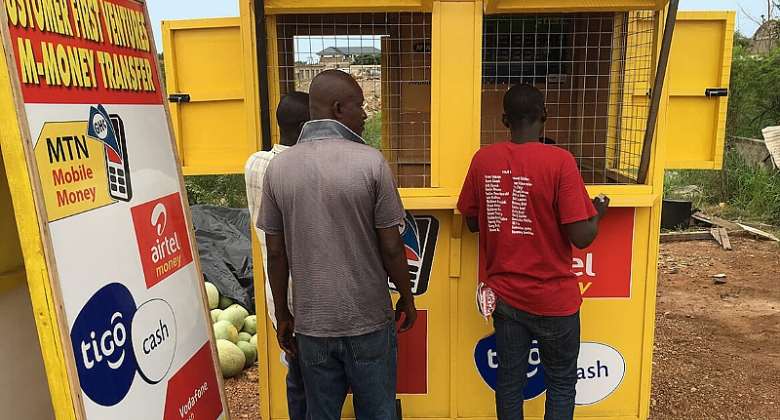
ISSER calls for dialogue over MoMo compensation impasse
The Institute of Statistical, Social and Economic Research (ISSER) has expressed worry that if the impasse between electronic money, popularly known as mobile money (MoMo) operators and their agents, is not resolved it will adversely affect financial inclusion significantly.
The policy research institution of the University of Ghana maintained that MoMo agents had become one of the most important drivers of financial inclusion in the country and the disagreement over compensation and threats to restrict withdrawals had the potential to derail the gains made so far.
ISSER, therefore, called for stakeholder dialogue to address the challenges leading to the impasse between the parties, stressing that evidence-based discussion would help find a fair and sustainable compensation model for MoMo agents without jeopardising financial inclusion.
The research institution also called on the regulator to intervene as a referee to bring the two parties to the negotiating table, given the scale and extensive potential of the operation of agents on the livelihoods and welfare of consumers, ISSER said in a statement issued in Accra.
“We encourage all parties to be guided and informed by evidence in negotiations to ensure equity and fairness in the structuring of compensation and value sharing between MoMo providers and their agents.
“Negotiated outcomes should aim to keep agents in business without jeopardising gains made in financial inclusion,” ISSER through its new research initiative, Retail Finance Distribution (ReFinD) research, said.
The context
The Mobile Money Agents Association of Ghana in a release on November 30, announced a decision to restrict withdrawals to a maximum of GH¢1,000 per transaction for a month.
It noted that there was possibility for further action if no favourable adjustment was made to their compensation by the telecommunication companies.
The release by ISSER also indicated that the parties should take into consideration the cost of operation for agents, the pricing mechanisms of the providers and agents, and the profitability and security of agents among others.
“Stakeholders could also consider the compensation structure across peer markets within Africa and Asia to serve as benchmarks.
To this end, ISSER, through its Retail Finance Distribution (ReFinD) research initiative, is committed to serve as a research partner to support the process.”
The release stated that mobile money had become the lead driver of financial inclusion in the country - accounting for about two-thirds of Ghana’s remarkable achievement of 95 per cent financial inclusion rate, according to the Ghana Financial Sector 2021 Demand Side Survey.
The mobile money agents have remained the wheels for extending the reach of MoMo across the country.
It highlights that MoMo agents represent the closest formal financial service provider to consumers across the country, with 92 per cent and 76 per cent of adults reaching a MoMo agent in less than 30 minutes in the urban and rural areas, respectively.
Hence, MoMo agents have become integral to the financial inclusion architecture of the country.
Therefore, any change to their operations will impact the country’s financial inclusion progress.
Demand
ISSER understands that the recent industrial action hinges on a demand for fair compensation for a sustainable business case by the agents.
Under the current compensation structure, a flat fee of GH¢10 is deducted from transactions of GH¢1,000 and above.
The GH¢10 is then shared between the agent (40 per cent) and the MoMo provider (60 per cent).
Thus, a transaction of GH¢5,000 will earn the MoMo agent a commission of GH¢4 under the old model.
With this new action by the agents, a withdrawal of GH¢5,000 will earn the agents GH¢20 since the customer has to make five withdrawals of GH¢1,000 each to receive the desired GH¢5,000.
However, this will cost the customer GH¢50, an increase of GH¢40 from the old rates.
ISSER is of the view that a unilateral action has the potential to derail the gains made in financial inclusion and the development of a cash-lite economy.
Impact
ISSER in the release acknowledged the concern of MoMo agents for an improvement in compensation.
It cautioned that the current unilateral action could be detrimental to gains made in financial inclusion and the transition to a cash-lite economy.
In the medium to long term, the sharp increase in the cost of withdrawal will drive customers away and inadvertently reduce the profitability of agents.
“We call on all stakeholders to resort to evidence-based dialogue for a fair compensation model that will not jeopardise gains made in financial inclusion,” it said.
